Symbian Anna debuted a while ago with the Nokia X7 and the E6 but the original quartet of new generation Nokia phones that initially launched with Symbian^3 now gets to join in on the fun as well.

We put a Nokia N8 through the update process and fiddled with it – then we decided you might be interested in a quick Symbian^3 vs. Symbian Anna comparison. X7 and E6 owners might not, but if you have a Nokia N8, C7, C6-01 or E7 you should check this out.
We’ll start off with how your phone to update to Anna. And while it’s going through the process, you can read through the rest of this article to see what changes you can expect.
Getting Symbian Anna
Before we start comparing Anna to its ^3 predecessor, we’ll go over how to update to Anna first. If you’ve bought an X7 or an E6, you’re all set, but those who have the Symbian^3 Nokias need to do this.
Now that Anna is officially out, the simplest way to update is straight on the phone. Get to the Device updates screen (either from Settings or by entering *#0000# into the dialer). Hit Options and choose Check for updates. After the phone confirms there is new software available, hit accept and enjoy Anna after the update process finishes.

Yet another way is to use the SW update app, which can be set to check for new update automatically.
Another option is to use Ovi Suite. After connecting your phone, Ovi Suite will check for updates (you can do it manually too) and will show a notification on the top row of buttons. It’s a good idea to do a backup of your phone before you start – you have Ovi Suite connected anyhow, best to be safe.
If you’re on a Mac, you have Nokia Software Updater at your disposal. It works just like Ovi Suite – connect the phone, app will check for updates and apply them if it finds any.
User interface changes – better text input, little else
It may not be immediately apparent to the untrained eye just what exactly Anna does to the homescreen to give it a nudge in the direction of usability. But after using it for a bit, you start to notice things.
We shot a new video of the user interface – check out Anna running on the N8:.
The new style icons might be the first thing that hits you – the simple, rounded icons are a god new look for Symbian – or it could be that scrolling the homescreen is much more tangible. You “push” the homescreen sideways and it moves, instead of the old homescreen that moved only after you’ve finished with your swipe.
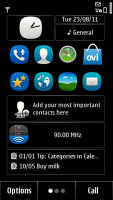
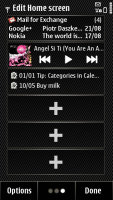
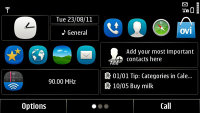
The Symbian Anna homescreen is not very different from the Symbian^3 homescreen
Other things haven��t changed however – the hierarchical menu that is a throwback to a past era is still here. You can rearrange your icons, but the flat menu structure that iOS and Android have popularized is hard to achieve.
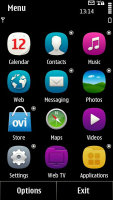
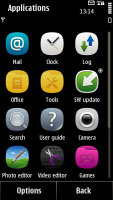
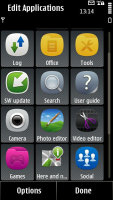
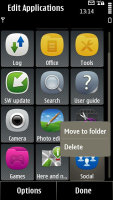
Same old same old menu
The task manager that only fits three apps at a time hasn��t changed either – landscape mode offers much more space but it still only fits three. If you’re not in the habit of closing your apps, you’ll have to do quite a bit of scrolling to switch between them.
The one UI change that really makes Anna a must-have for Nokia owners is the new text input – lo and behold the split screen keyboard.
In previous versions of Symbian you had two options – go to a new screen to enter your text on a full-screen landscape QWERTY and then go back or use that tiny, movable QWERTY keyboard that was basically a pain in the butt.
Anna however enables the portrait QWERTY, which overlays the bottom half of the screen and lets you stay in the app and type simultaneously. Besides letting you enter text without flipping the phone to its side and without going back and forth in the UI, it enables more subtle changes – like autosuggestion in the web browser that actually works.
The keys on the portrait QWERTY are a bit small, despite the available screen estate. Still, you can activate word prediction, which will fix the word you’re trying to type and show a small popup with the word you actually typed, in case you’re trying to enter something like a user name (which doesn��t have to be a valid word, in fact word prediction in this case gets in the way).
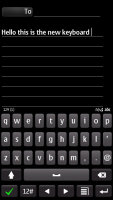
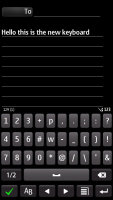
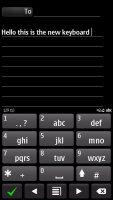
The new portrait QWERTY doing the split-screen ? old keypad-style keyboard
The landscape QWERTY keyboard is also available in split-screen mode and it offers bigger, easier to hit keys, making it the preferred option for entering long text.
Still, it’s not perfect – several apps would popup the old text edit screen, covering the app screen even though we were using the portrait QWERTY. The Ovi store app is an example of where that happens, which was a little disappointing.
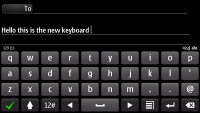
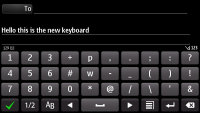
The landscape keyboard does split-screen too
So, while Symbian Anna isn’t a huge change in the interface department, it does sand away some of the rough edges of Nokia’s aging OS.
However, some of the native apps also received an update, which improved the general functionality of the phone.
Native Symbian apps were updated too
The most noticeable change is in the web browser – it’s a lot user friendlier now, with its proper URL bar (thanks split-screen QWERTY!), the always visible back button (vital for navigating web pages) and things like manually opening new tabs (before Anna the only way to open a new tab was to set a link open in a new tab).
Those are changes we’ve been expecting for ages and we cheered when Nokia put them in the X7 and E6. And now, Nokia’s first wave of new Symbians can enjoy it too.
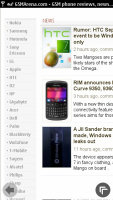
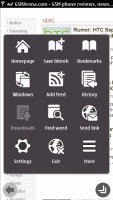
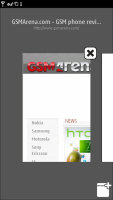
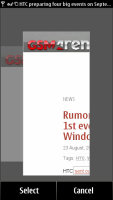
The new browser has improved user interface
But Anna is not Froyo – Flash is still pretty much no-go on Symbian, with only Flash Lite 4 supported. So, no watching YouTube videos in-browser or playing Flash games. And the new interface, as much as it improves on the old one, is still miles behind Mobile Safari and the Android browser.
Another native Symbian app that got a major improvement is Nokia Maps, which went up to version 3.06. That’s the version you get with the new OS update, but v3.06 is available for older Symbian versions and older phones too, so you’ll only see a difference if you haven’t updated Maps separately.
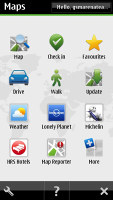
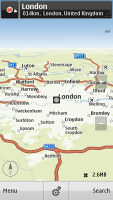
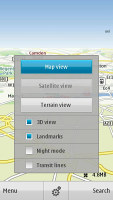
Ovi Maps gives you free lifetime voice-guided navigation over the excellent Navteq maps
Still, the new version brings a redesigned menu and improved search functionality. Also, public transport lines are available on the maps with the new version and you can download country maps directly on the phone (you no longer need a computer to do that). Social network check-ins are also part of the new package.
Speaking of SNS skills, Anna adds a few niceties here too – you can check out the latest status updates by your friends in their contact cards in the phonebook, you can upload high-res images and add captions to them too. Retweeting has also been added as an option.
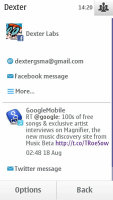
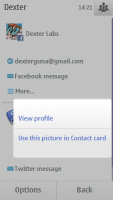
Reading the latest status updates from a contact
Finally, the Store has been updated and can now download bigger apps over Wi-Fi but there are no visual changes.
Conclusion
Symbian hasn��t seen any groundbreaking changes in its recent history and Anna isn’t one either – like the jump from ^1 to ^3, it’s an incremental update that improves things but leaves some rough edges untouched.
Don’t get us wrong – Anna is the best that Symbian has to offer right now (until Belle arrives anyway) and people with an N8, a C7, C6-01 or E7 should update as soon as possible – the browser alone is a good enough reason.
N8 owners have a special incentive too – with Anna installed, they can apply the camera update and enjoy 30fps videos with continuous autofocus (and a slightly better UI). Let’s face it, people bought N8s chiefly for its camera, so Nokia continuing to improve it is commendable. We’ve covered that in another post.
Still, the number of things left that need changing is much longer than the list of things that have changed. On the other hand, after Nokia announced they’ll be focusing on Windows Phone 7, we were worried about Symbian’s future.
It turns out those worries were unfounded – with Anna out now and Belle just around the corner (and there are 1GHz Symbian devices out too), Symbian seems more alive now than it was a year ago.
There’s a long way to go before it catches up to Android, but we’ll be following it (and reviewing it) every step of the way.
What are your impressions – is there still fight left in Symbian or are these updates just a stopgap measure while we’re waiting for the Nokia-made WP7 phones to show up?
没有评论:
发表评论